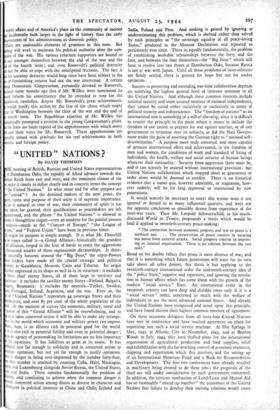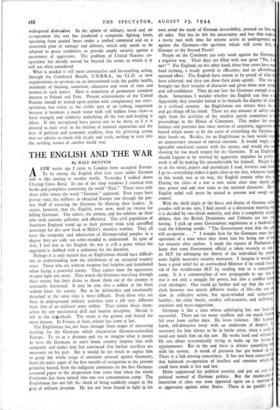" UNITED " NATIONS?
By DAVID THOMSON
HE meeting of British, Russian and United States representatives at Dumbarton Oaks, the rapidity of Allied advance towards the an Reich from east and west, and the imminent climax of the make it timely to define clearly and in concrete terms the concept "the United Nations." In what sense and for what purpose are y "united " ? As the destined makers of the next peace, the e, terms and purpose of their unity is of supreme importance. , as is natural in time of war, their community of spirit is too a taken for granted, their qualifications as peacemakers are left questioned, and the phrase "the United Nations" is allowed to me a thoughtless slogan—even an anodyne for the painful process analysis—much as the "Concert of Europe," "the League of nons," and "Federal Union" have been in previous times.
n origin its purpose is simple enough. It is what Mr. Churchill at times called it—a Grand Alliance—historically the grandest all alliances, forged in the heat of battle to resist the aggressions threatened attacks of three expansionist dictatorships. It there- naturally focusses around the " Rig Four," the super-Powers ose leaders have made all the crucial strategic and political sions at Qasablanca, Moscow, Cairo and Teheran. Its origin urther expressed in its shape as well as in its structure : it excludes three chief enemy States, all of them large in • territory and ulation : it excludes the satellite enemy States—Finland, Bulgaria, gary, Roumania : it excludes the neutrals—Turkey, Sweden, Portugal, Ireland, Argentina, and the rest. Even so, the of "United Nations" represents 44 sovereign States and their ndencies, and over 85 per cent, of the whole population of the rid. At the moment of victory the economic, military, naval and Power of this "Grand Alliance" will be overwhelming, and so g as it takes concerted action it will be able to make any arrange- s in the world which economic and military power can impose. re, then, is an alliance rich in potential good for the world. t it is also rich in potential futility and even in potential danger ; as an agency of peacemaking its limitations are no less important its capacities. It has liabilities as great as its assets. It has loped just far enough in solidarity and in concerted action to urage optimism, but not yet far enough to justify optimism. tie is danger in being over-impressed by the number forty-four, this number is attained by counting Cuba, Haiti, Nicaragua, a and Luxembourg alongside Soviet Russia, the United States, and India. There remains fundamentally the problem of eving, and continuing to achieve when the common danger is ed, concerted action among States so diverse iit character and
divergent in political interests as China and Chile, Iceland and
India, Poland and Peru. And nothing is gained by ignoring or underestimating this problem, which is shelved rather than solved
by such principles as "the sovereign equality of all peace-loving States," produced in the Moscow Declaration and repeated so persistently ever since. There is, equally fundamentally, the problem of establishing workable relationships between the forty and the four, and between the four themselves—the "Big Four" which still have to resolve into two threes at Dumbarton Oaks, because Russia is not at war with Japan. Until all these problems of inter-relations are firmly settled, there is ground for hope but not for undue optimism. , Success in preserving and extending war-time collaboration depends on satisfying the highest general level of interests common to all the United Nations. And although these common interests include national security and some assured measure of national independence, they cannot be stated either inclusively or exclusively in terms of political security and independence. The "freedom of nations" as an international aim is something of a will-o'-the-wisp, since it is difficult to restrict the principle to the point where it ceases to include the freedom of one nation to prepare for war against another, or of one government to tyrannise over its subjects, as did the Nazi Govern- ment under the guise of asserting the German right to "national self- determination." A purpose more truly universal, and more capable of genuine international effort and achievement, is the freedom of men and women, the conditions of work and standard of living of individuals, the health, welfare and social security of human beings whatever their nationality. Security from aggression there must be, and it can scarcely be assured without international provision: but United Nations collaboration which stopped short at guarantees of order alone would be doomed to sterility. There is no historical evidence that a status quo, however admirable, or stagnation, how- ever, orderly, will be for long approved or maintained by new generations.
It would scarcely be necessary to assert this truism were it not ignored or denied in so many influential quarters, and were not the opposite conclusion so plausibly drawn from experience of the inter-war years. Thus Mr. Leopold Schwarzschild, in his much- discussed World in Trance, propounds a thesis which would be fatal if applied to twentieth-century peace-making:
"The connection between economic progress and war or peace is a mythical one. . . . The preservation of peace consists in securing our house from external attacks. Social progress consists in improv- ing its internal organisation. There is no relation between the two tasks."
Based on the double fallacy that peace is mere absence of war, and that it is something which future generations will want for its own sake above all other desires, this thesis is but applying to the twentieth-century international order the nineteenth-century idea of the "police State," negative and repressive, and ignoring the revolu- tion in human affairs which has come about with the growth of the modern "social service" State. An international order in the twentieth century can have deep and durable roots only if it is a "social service" order, concerned as much with the welfare of individuals as are the most advanced national States. And already the United Nations have recognised and acted upon this principle, and have found therein their highest common measure of agreement.
On three occasions delegates from all forty-four United Nations have met in conference and have reached agreement on plans for organising just such a social service machine. At Hot Springs in May, 1943, at Atlantic City in November, 1943, and at Bretton Woods in July, 1944, they have drafted plans for the international organisation of agricultural production and food supplies, relief and rehabilitation with the far-reaching control of economic resources, shipping and repatriation which this involves, and the setting up of an International Monetary Fund and a Bank for Reconstritction and Development. The first two conferences have already resulted in machinery being created to do these jobs ; the proposals of the third are still under consideration by each government concerned. In addition, the intricate mechanism of Lend-Lease and Mutual Aid has so thoroughly "mixed up together" the economies of the United Nations that failure to develop their existing relations would cause widespread dislocation. In the sphere of military, naval and air co-operation the war has produced a composite fighting force, operating from pooled bases under a unified command and on a concerted plan of strategy and defence, which only needs to be adapted to peace conditions to provide ample security against a recurrence of aggression. The problem of United P Nations co- operation has already moved far beyond the terms in which it is still too often considered.
What is needed is still more constructive and far-reaching action, through the Combined Boards, U.N.R.R.A., the I.L.O. or new organisations, to promote on an international scale the public health, standards of housing, sanitation, education and work of men and women in each nation. Here is something of permanent common interest to Poland and Peru. Present achievements of the United Nations should be looked upon neither with complacency nor over- optimism, but rather as the visible part of an iceberg, important because it betokens a much vaster bulk still hidden from view—a basic strength and solidarity underlying all the rest and keeping it afloat. If this unexplored basis proves not to be there, or if it is allowed to melt away in the friction of national separatism and the heat of political and economic conflicts, then the glittering crown that we admire so much will topple and crash, melting in turn into the swirling wastes of another world war.



























 Previous page
Previous page